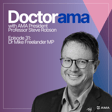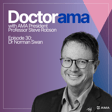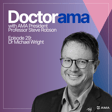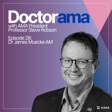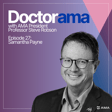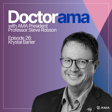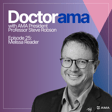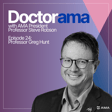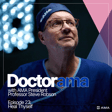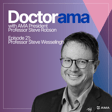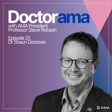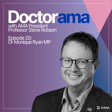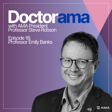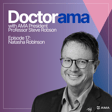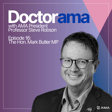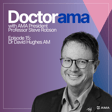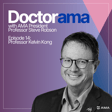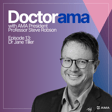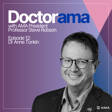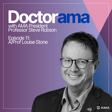Become a Creator today!Start creating today - Share your story with the world!
Start for free
00:00:00
00:00:01

Episode 19 - Professor Paul Kelly
In episode 19 of Doctorama AMA President Professor Steve Robson chats with Professor Paul Kelly.
Recommended
Transcript
Introduction to Dr Ram Episode
00:00:00
Speaker
Well, for many years it was almost an anonymous public service job, but not anymore. And today I'm going to be talking to the holder of possibly one of the most high profile medical jobs in the country. You're going to find out who that is today on Dr Ram.
00:00:19
Speaker
You're listening to Dr Rama with Steve Robson, bringing you the best of health, medicine and people.
Interview with Prof. Paul Kelly: Career & Background
00:00:26
Speaker
Well, my guest today is the Chief Medical Officer for Australia, Professor Paul Kelly. Paul, welcome to Dr Rama. Real pleasure to be here. Thanks, Steve. Thank you very much. I know just how busy you are.
00:00:39
Speaker
You're a public health physician and an epidemiologist, and you're very, very visible in the role you have. But a lot of people probably won't have a sense of how you got to where you are. And I'd love to hear a little bit about your career. I know that you've had all sorts of jobs in the ACT, the Northern Territory, you work with the WHO and overseas.
00:01:04
Speaker
Love to hear a bit about how you got to where you are at the moment, Paul. Well, thanks, Steve. Actually, it's 40 years since I graduated from the University of Western Australia. I'll keep that quiet for you.
00:01:16
Speaker
I know that because we've got a reunion in a couple of weeks and they've asked me to talk about some of the topics we're going to talk about today. So I've been a doctor for that period, about 20 years of clinical work and about 20 years of public health, including the last 13 as a senior health executive role in the ACT, as you mentioned, or recently in the Commonwealth. I've worked as a clinician of public health
00:01:42
Speaker
Doc on the ground. I ran a 200 bed hospital in Malawi some years ago. Worked in administration more recently. Been a researcher and educator. I've worked in five different countries and four states and territories. So quite a wide range of experiences through that
Importance & Challenges of Epidemiology for Young Doctors
00:02:00
Speaker
period. You were trained as an epidemiologist and a public health expert. Can you tell us a little bit about the routine, I guess, demands of those roles?
00:02:11
Speaker
And importantly, would you encourage a young recently graduated doctor today to sort of follow the pathway into epidemiology, into public health, into the sort of medical space that you work in? Well, it's not for everyone, Steve. I've thoroughly enjoyed it. And I've listened to a few of your other podcasts recently of people in that similar sort of role. And the thing that strikes me is it's a very holistic view of health and of people.
00:02:41
Speaker
We don't cure one person, we treat thousands at a time in population health and epidemiology as a key skill set within public health to understand what the problems are and to work out how to fix them.
00:03:00
Speaker
It was something that wasn't really stressed in medical school back in the day when I was there. I think we had one lecture on public health for the entire six-year period. And I often talk about where the public health
00:03:18
Speaker
Department, such as it was, was a tiny little old 1940s bungalow on the side of what was then the new Queen Elizabeth II Medical Centre, Charlie Gardner's and now the kids' hospital and a whole bunch of other hospitals there in Perth near Kings Park.
00:03:38
Speaker
This was a tiny little three-bedroom shack, essentially, and that was the Public Health Department. Things have changed. So I didn't get exposed much there, but I was very interested in infectious diseases through medical school and tropical medicine in particular. I did some rural placements in WA, up in the Kimberley and out in the Goldfields, and then also
00:04:02
Speaker
a jury medical school and beyond. And I did an elective in Malaysia and it was through those that I got really involved and engaged with tropical medicine and with prevention at that time. I did a tropical medicine course in London in the late 80s. But really it was my work in Malawi that opened my mind to
00:04:26
Speaker
to public health and what could be done in that process. And when I came back from Malawi, having always thought I'd be a rural GP, found that the rules had changed and so I explored public health as an option. And I've never looked back, I've really enjoyed my time in that and the experiences I've had both here in Australia and overseas working in that sphere.
00:04:49
Speaker
So it's not for everyone, but I certainly would encourage young doctors to think about this as a career and to really explore it early on.
Role of the Chief Medical Officer During Pandemic
00:04:57
Speaker
Paul, you have been a doctor for 40 years and you've had that division between clinical on the ground work and the broader and higher level work that you do. But in the role at the moment as the chief medical officer, a lot of people will be familiar with the title.
00:05:15
Speaker
be familiar with the position, but not really know what it involves. Are you able to just tell the listeners, I guess, what the role of the Chief Medical Officer for the country is? Well, I guess one way of looking at it is, and this certainly became a very prominent part of the role during the pandemic,
00:05:38
Speaker
is as the principal medical advisor to the Commonwealth government so there are a number of chief medical officer roles within the Commonwealth public service but mine is seen as the kind of premier one of that so when asked.
00:05:55
Speaker
almost daily by the Prime Minister through those couple of years or the Health Minister about stuff and it's very broad. I either answer or I say I'll get back to them because I can't hold all of that in my mind. But mostly, certainly during the pandemic, it was something that I had been trained to do and knew very well and was prepared for.
00:06:20
Speaker
Very often, I was able to go back to first principles or to go and rapidly find someone who a friend I could call or a place in a journal to get that answer and advise promptly. That's the main role. I'm also under the Biosecurity Act. I'm the chief
00:06:42
Speaker
health biosecurity officer for the country, so there's a range of statutory roles there, but I'm not really a statutory appointment like the Chief Health Officers in states and territories. I don't have a decision-making role, but I do have delegated authority to do certain things. I do some
00:06:59
Speaker
I'm also on the Department of Health executive and give a clinical and prevention focus there. But then there's all sorts of strange stuff that I have to do, some of it definitely within my experience. So, you know, any ATAGI statement or any work that goes into the immunization handbook, and it's used by doctors all around the country every day, that goes through under my eyes and with my expertise as part of that.
00:07:29
Speaker
Biosecurity Act I've mentioned, all of the Australian Health Protection Principle Committee statements that went out. I'm the chair of that committee, as you said, and so that has all gone through me, all the guidelines for public health responses to infectious diseases, environmental health and other hazards that goes through me. I've got a few delegated things under the Health Insurance Act, for example, anyone that wants to have qualified privilege around
00:07:59
Speaker
around registries and the like that comes to me for decision. Under the Secure Specimens Biosecurity Act as well, the Medicines Treatment Overseas Program, anything that is written on a cigarette packet has to be signed off by me.
00:08:21
Speaker
any of the health promotion messages that go out have to be signed off by me. And most recently, the Dust Disease Registry that's just been formed around silicosis, there is specific mention of the CMO in that new act around responsibilities I have to check the veracity of things and to report once a year on where we're up to with that. So that gives you a bit of a flavor. But, you know, look,
00:08:48
Speaker
in the pandemic it really became very clear you know lots of lots of press and media media briefings going to cabinet a lot and giving that advice directly into the decision making process including a national cabinet of extraordinary times I had to keep pinching myself that I was there as part of that process but incredibly demanding but but but very enjoyable role so
00:09:13
Speaker
Paul, you bring this up and of course the pandemic was so unexpected, so unprecedented, but the work that you did, I know my friend Brenna Murphy and you worked together an enormous amount across this, it must have been
00:09:33
Speaker
not only professionally, but personally, a very, very stressful time. The stakes were very high.
Managing Stress During the Pandemic
00:09:40
Speaker
How did you look after yourself during that really intense period? It was a very intense period, Steve, and people ask me, was it the hardest job I've ever done? It wasn't. My role when I was working in a very clinical role in Malawi was the hardest work I've ever done. That was back in the 1980s when I was much younger.
00:10:00
Speaker
But this was certainly a demanding role. There were long days and usually would start before six and often not finish till after nine or ten at night. So there wasn't much time to do other things.
00:10:17
Speaker
But, you know, extraordinary uncertainty, of course, through that period in advance to make decisions in that uncertainty. So that was challenging. As you mentioned in the preamble, we became well known and sometimes it was good people would come up to me in the street and say, well done. I do remember walking with
00:10:37
Speaker
Walking with Brendan one time coming from a national cabinet meeting actually in Sydney. Walking along Macquarie Street and this white four-wheel drive came zooming around the corner. This guy leaned out like half a body length out of the car and said, you're doing a great job fellas.
00:10:55
Speaker
So that was nice. But the opposite also happened. I found myself in amongst a protest in being in the wrong place in the wrong time. And at an AMA meeting, you may have been there when I wasn't actually in the room. Luckily, I was able to switch off the video.
00:11:13
Speaker
Someone really got stuck into me there so that that happens. So that was tricky. But look, I have mentors. I use them a lot. One of them was my dad who just passed away recently. But he was a great mentor during that period. He was not backward in coming forward with advice about my latest press conference.
00:11:36
Speaker
There were others I didn't listen to, like one of my aunties who suggested that I had a perfect face for radio. And so I ignored that one. But mentors were important. Others, you know, colleagues, long-standing colleagues, you know, who I was able to bounce ideas off. And of course, the Chief Health Officer's
00:12:01
Speaker
We came to know each other very well during that period. We used to meet about three or four times a year, but during the COVID pandemic from the end of 2022, we met 567 times, which was extraordinary.
00:12:20
Speaker
I'm a swimmer. I find if I can get in a pool and swim that's a very meditative thing for me and I can switch off during those periods. Occasionally I like to dance but that was tricky during the pandemic because I'm full of 80 year olds.
00:12:36
Speaker
Scottish dancing was off the menu there for a while, but that's another way I've been able to do that. And it'd be remiss of me not to mention my wife Jenny, who was an extraordinary
Collaboration Between State & Commonwealth Officials
00:12:47
Speaker
supporter throughout that whole period. And I couldn't have done it without her.
00:12:51
Speaker
Look, you brought up the fact that you had so many meetings with your state and territory colleagues. Can you explain for our listeners just a little bit about that interaction between the Commonwealth Chief Medical Officer and the state and territory chief health officers? How does that all work? Because there's a big division of responsibilities there. There is, and as occurs in the health system more broadly.
00:13:21
Speaker
I heard your chat with Minister Butler recently about this. We can't do stuff as a Commonwealth without the States and there are parts to be played in all jurisdictions, whether that's at the Commonwealth level or state and territory level.
00:13:40
Speaker
And so that's important to understand. I was explained to me very early on when I joined the AHPPC in 2011 that we were all equal and I was at the ACT at that time, so I quite enjoyed that. I used it to say stuff and I know it was annoying to some people, but it's the same as the chair. I'm just one of nine jurisdictions at the table and we're very respectful of each other. We listen
00:14:10
Speaker
everyone gets a chance to say stuff. And during the pandemic, that almost always worked very well, being respectful and cordial to each other, giving time for people to talk about their concerns and try to look for consensus wherever that's possible.
00:14:28
Speaker
I've always seen my job as the chair of HPC as to be a sounding board to my state colleagues. In many ways, their job was much harder than mine. They were decision makers in this process as well as advisors. And so that's something I've always taken on board. And to this day, I will always take a call. I try to ring them.
00:14:56
Speaker
individually on a regular basis as well, particularly at this time when we're not meeting quite as often. Just got off the phone from our Queensland colleague just now actually, but that's something I do like to do, just to check in on them, make sure that we
00:15:13
Speaker
if there's things I want to share with them and get their views, or if they've got stuff that's particularly worrying them, it's an opportunity to consider that. But it's a fantastic network. There were many heroes during the pandemic, but the AHPPC members were extraordinary, and I had continues to go off to them.
00:15:36
Speaker
Paul, there's a huge difference between that sort of national perspective that you have to take in your role across all things medical to the typical patient-based approach that clinicians like myself take in medicine. What would you say are the big differences that you found? Because you've gone from being clinically hands-on to being at this higher level. Do you miss it? Are there big differences that you've noticed?
00:16:04
Speaker
Yeah, look, I do miss that clinical interaction. There's no doubt. There's something
00:16:12
Speaker
so special about the privilege we have as clinicians to work with individual people on their own individual journeys. I do miss that. There's an intimacy to that and also an instant feedback. Not always positive, but usually positive from that interaction.
00:16:36
Speaker
Having said that, yes, it's a different role, but there's similarities as well. The national health perspective and public health and my role starts with people.
00:16:46
Speaker
It starts with listening to people, talking with people, understanding people's perspectives. That's, as I said at the beginning, it's at a population level, but it's individuals within that population. I use my clinical medical knowledge at work every day. That's certainly a basis about how I work.
00:17:10
Speaker
Yes, there are differences. I guess if I think about my sweet spot, it's somewhere between policy, politics, medical knowledge, and communication, communicating with people from a variety of perspectives and a variety of their perspectives.
00:17:32
Speaker
And I've done quite a bit of communications workshops and media training and so forth over the years, but the most insightful one I had was actually a retired ABC journalist, Peter Thompson. I don't know if you remember him, but he introduced me to the Aristotle
00:17:52
Speaker
Aristotleian way of thinking about logos, ethos, and pathos in relation to media. You can't mention that without giving a bit of detail, Paul.
00:18:05
Speaker
So ethos is the great word for where ethics comes from, but also it's your standing in the community. So having the chief medical officer logo or description of me helps with that when I'm giving a press conference or a media thing.
00:18:31
Speaker
I will talk about the fact that I'm a public health expert. I'm an epidemiologist. I've worked in infectious diseases for 40 years. So that's the ethos component. Pathos is the individual. The thing I was started with here, which is it's about... That's the web.
00:18:53
Speaker
empathy comes from as an English word. And so understanding where people are coming from in relation to how the suffering that was very important for COVID, it was important for the unintended consequences of some of our public health actions during that period around school closures, border closures and the like, is understanding that this affects people. And then there's the logos, which is the medical knowledge and how that so logic is where that comes from.
00:19:22
Speaker
So yeah, that's where I work every day and I always think about those three things whenever I'm going to talk to anyone. Paul, Australia is a country that is moving forward and clearly there are challenges.
Major Health Challenges in Australia
00:19:36
Speaker
You're in a unique position to sort of, I guess,
00:19:38
Speaker
make a call on what you see the big health challenges are for the country. Have you got any thoughts on that? What you would see as the big challenges we're facing as a country in the health space? Oh, there's lots. To start with, I think we have a fantastic health system and wonderful people working within it. And compared with many other countries, we're doing pretty well.
00:20:04
Speaker
The pandemic demonstrated what we can do as a country when we work together on wicked problems and have that commitment to fix them and fix them quickly. And I think that's something we need to take forward as a learning from that space. We can't always work on one bug. But it just demonstrates what we can do together as a nation with
00:20:31
Speaker
clinicians and with industry and so forth. So I have a lot of hope for the future, but there are challenges. I think from a kind of meta perspective, climate change clearly is a challenge for all of us in all sorts of sectors, but including in health. I think some of the public health challenges that come from that in terms of
00:20:58
Speaker
Of heat of vector-borne disease, of more frequent severe weather events, things that may lead to disruptions of our supply chain, as we saw in the pandemic, possibly not as quickly as that, but around those matters.
00:21:17
Speaker
I'm clearly involved with that, the likelihood of another pandemic occurring from one of those tricky virus groups. I think demographics is another challenge. We're an aging population.
00:21:34
Speaker
And that is already demonstrating. Keeping an eye on equity and having that lens on everything we do is an important thing. But as health dollars become less available for more and more expensive things, I think we have to always have that in front of mind. And that takes me also to the rise of genomics, personalized medicine, and
00:21:58
Speaker
and new, very exciting ways of dealing with some of our most challenging clinical problems. We have to keep that equity lens in there and to make sure that as we go through that exciting change.
00:22:13
Speaker
For example, someone was telling me the other day, there's 4,000 CAR T and CAR NK therapies in clinical trials right now around the world. Extraordinary. 4,000. 4,000 of them. Yeah, that's a big challenge. We need to take it on and consider where Australia sits with that. These are expensive treatments, but incredibly effective. How does that fit into our way of dealing with the clinical sphere?
00:22:43
Speaker
There are many others, but there's some biggies for me. I would be remiss to not mention anti-microbial resistance in there as well, which is probably being driven by the climate change and one health issues, but it's broader than that as well. Yeah, I discussed some of this with Professor Hilary Banbrek in a podcast earlier in the year about all of these challenges that the changing climate will throw up for all of us.
00:23:10
Speaker
Let me mention one more thing I should do which is around workforce and the change in how we look at workforce. So a lot of work being done at the moment at the national level and with the states and territories and the colleges of course and indeed with the AMA around models of care and changes in the way we do that virtual care and different ways that AI might assist or disrupt some of those things.
00:23:38
Speaker
There's another challenge but enormous opportunity for us to take on as a nation and as doctors. You obviously have had many years of experience in the field.
00:23:51
Speaker
What advice would you give to an aspiring doctor who wants to make a difference in public
Advice for Aspiring Public Health Doctors
00:23:57
Speaker
health? What advice have you got? Look, don't rush into public health if you're an aspiring doctor or a junior doctor and you're interested in the sorts of things I've been talking about today and say, yeah, I'd like to be chief medical officer one day. That certainly never entered my mind. I'd never heard of the chief medical officer when I was a junior doctor.
00:24:19
Speaker
In fact, I don't think we have one. So don't rush into it. Do some clinical work. Do some broad clinical work. Make sure you're part of and understand the health system. That's what's going to make a difference if you want to become a public health physician. Take your opportunities. Work internationally if you can. Get a network. Think holistically. Of course, do a Master of Public Health.
00:24:47
Speaker
But then, you know, go from there. It's not a linear thing. Rasp for those opportunities when they come. You never know where they're going to lead. And one key thing for any junior doctor, this is not just for public health, but anyone who might be listening in other fields, grab good mentors early and keep them.
00:25:06
Speaker
They are like gold dust. They're rare, but when you find them, they're so valuable. That wisdom that comes from those interactions is extraordinarily helpful for career planning and for support when things get tough.
Closing Remarks & Future Invitations
00:25:26
Speaker
Paul, I always enjoy our chats. I'm extremely grateful for the time you've spent speaking with me this afternoon and to let you know you're welcome back anytime on Dr Rama. Thanks, Steven. It's been a real pleasure.
00:25:49
Speaker
You've been listening to Dr Rama, a podcast produced on Ngunnawal country by the Australian Medical Association. All rights reserved.
